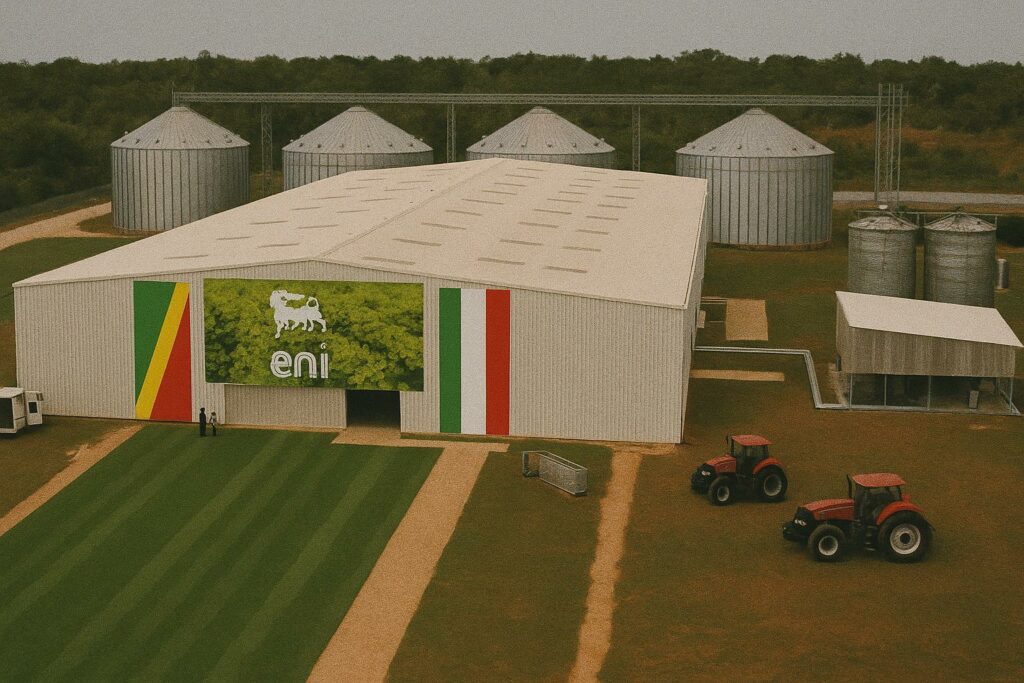A carefully calibrated local request
On 28 June, during a ceremony blending ancestral rites with modern corporate protocol, eleven land-owning families from Kimbaka addressed President Denis Sassou Nguesso through traditional emissaries. Their demand was both precise and emblematic: a formal hiring quota for local youth at the Agri-Hub Arturo Bellezza, the new biofuel complex operated by the Italian major Eni. The families, whose plots anchor the 42-hectare site near Loudima in Bouenza, also called for the prompt payment of annual land rents, a mechanism enshrined in Congolese law since the 1973 Land Code yet often subject to protracted negotiation. By invoking the Head of State’s arbitration, the petitioners placed their trust in the central administration’s capacity to balance community expectations with the national imperative of attracting foreign direct investment.
Biofuel ambitions and the energy transition agenda
Congo-Brazzaville’s decision to encourage biofuel production fits squarely within the National Development Plan 2022-2026, which emphasises diversification away from crude while reducing the carbon intensity of the domestic energy mix (Ministry of Planning, 2022). Eni, present in the country since 1968, intends to supply European refineries with low-sulphur feedstock derived from castor and other non-food crops cultivated on marginal land. Company reports suggest that the Loudima hub could process up to 150,000 tonnes annually once fully operational (Eni Integrated Report 2023). For Brazzaville, the partnership offers an opportunity to monetise idle acreage, secure technology transfer and capture climate-finance flows without relinquishing the sovereignty that has guided its hydrocarbons policy for five decades.
Socio-economic dividends for Bouenza’s youth
Eni currently employs roughly 450 people in Congo, 80 percent of whom are nationals. Government officials argue that the biofuel line, with its agronomic upstream, could double that workforce over the next four years, provided specialised vocational training is deployed in parallel (National Employment Directorate, 2023). Local mayors see the project as a buffer against the rural exodus that has drained Bouenza of nearly 12 percent of its youth since 2015 (World Bank demographic brief, 2022). In private, Eni executives acknowledge that a contractual quota reserved for Loudima residents would ease union-management relations and reinforce the corporation’s “shared value” narrative promoted in EU sustainability circles.
Land tenure, customary rights and corporate due diligence
The families’ request revives a long-standing conversation on harmonising statutory and customary tenure systems. While the 2018 Agricultural Land Law introduced the concept of Community Development Agreements, practical enforcement remains uneven, prompting periodic tensions in industrial corridors such as Pointe-Noire or Ollombo. Experts from the African Development Bank note that early inclusion of elders in environmental and social impact assessments reduces dispute settlement costs by up to 30 percent (AfDB Policy Paper 2021). In the Loudima case, negotiators have already mapped sacred groves and water points to be kept outside production blocks, a precaution hailed by civil-society mediator Pastor Jean-Claude Longotoma as “a signal that agribusiness and tradition can coexist if mutual respect prevails.”
Diplomatic and geopolitical ripple effects
Beyond local economics, the Agri-Hub reinforces the diplomatic symmetry between Brazzaville and Rome. Italy, eager to diversify energy imports in a post-Ukrainian-war context, has elevated African bio-commodities in its Mattei Plan announced by Prime Minister Giorgia Meloni in 2023. For President Sassou Nguesso, whose administration chairs the Congo Basin Climate Commission, showcasing a concrete low-carbon project bolsters his advocacy for a dedicated carbon market for tropical forests (COP27 ministerial statement, 2022). Analysts at the Institute for Security Studies observe that such flagship ventures enhance Brazzaville’s bargaining leverage in multilateral climate finance forums, while preserving its strategic autonomy vis-à-vis bigger petro-states.
Pathways toward a mutually beneficial settlement
Negotiations are expected to crystallise into a memorandum clarifying land rents, youth quotas and monitoring timelines before the first commercial batch leaves Loudima later this year. Senior presidential advisers indicate that Brazzaville favours a tripartite oversight committee bringing together the ministry of hydrocarbons, local chiefs and Eni representatives, echoing governance models tested in the forestry sector. Should the arrangement hold, the Kimbaka families could emerge as a showcase for equitable agribusiness, offering a template replicable in Sangha’s cocoa belt or Cuvette’s cassava clusters. The equation remains delicate, yet the political will expressed by all actors suggests that Loudima may indeed validate Congo-Brazzaville’s proposition that green industrialisation and community empowerment need not be mutually exclusive.

